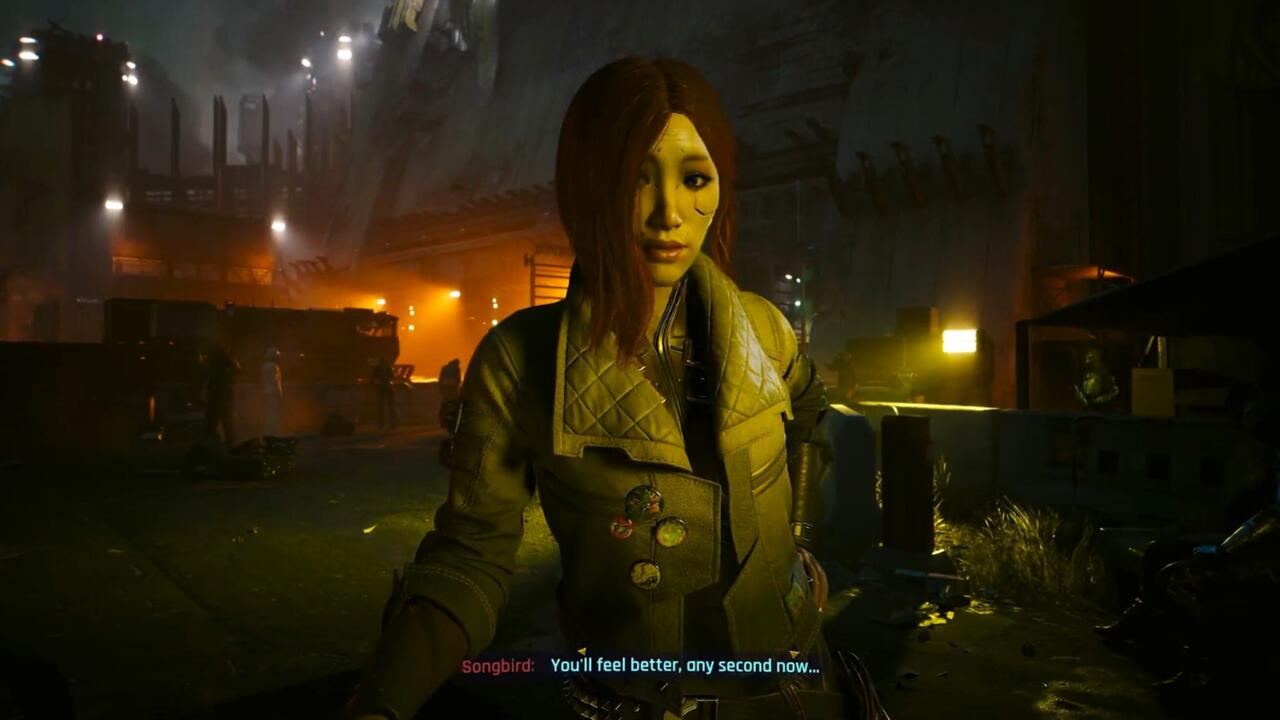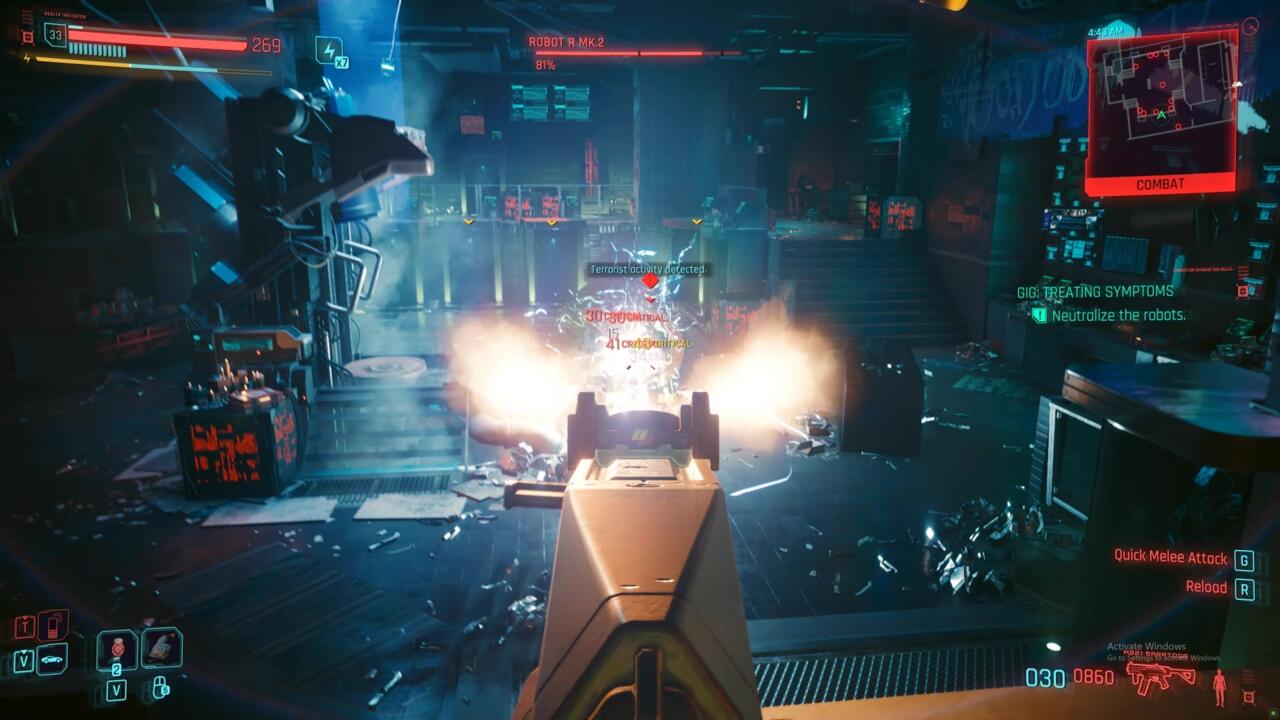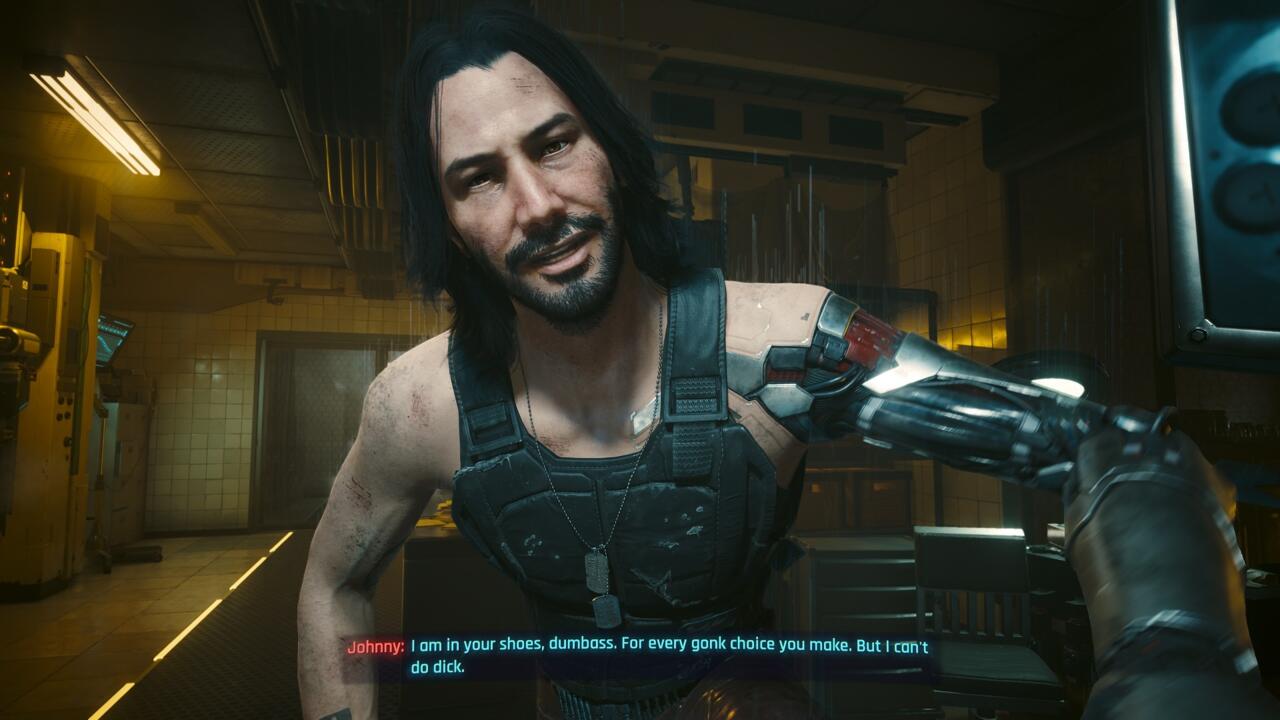The appeal of Night City was in its impressive scope and dazzling visuals, which painted a bleak neon-lit future dictated by technological exploitation and unfettered capitalism. Within that were tragic, human stories to pull at your heartstrings and a whole lot of violent action often perpetuated by its gameplay systems. But what if you took the best parts of Cyberpunk 2077 and condensed them into a tight, cohesive package for a heart-wrenching political action thriller? That's what Phantom Liberty does in an expansion that seamlessly fits into the original game.
Phantom Liberty showcases the full potential of Cyberpunk 2077 with a new, captivating story about the faults of loyalty, reckoning with your past and its consequences, and self-preservation in a tech-fueled dystopia. These are familiar themes, for sure, but Phantom Liberty is intimate, raw, and earnest--all told through the lens of a strong cast of characters elevated by poignant writing and delivered through sharp performances. It's able to execute on these narrative ambitions because, more often than not, the missions that drive the plot feature top-tier action set pieces that let the revamped RPG mechanics sing, then break the pace with a variety of tense and well-crafted non-combat scenarios, which gives the experience a constant and steady momentum.
More than anything, Phantom Liberty goes above and beyond with not one, but two finales that are wildly different yet equally stunning--hell, you could even argue it's three when counting the added ending for the original story. It's a fantastic mix of nearly everything you could ask of Cyberpunk. And after taking 30 hours to experience all of its content--both main story routes, the new ending, all the side missions and gigs, and more--I can't imagine Cyberpunk 2077 without Phantom Liberty.
While you can jump straight into the new content or use a save far enough in the base game, those starting fresh will have to make it to what's roughly the halfway point, right when the original story gives you parallel main questlines. Phantom Liberty acts as another branch to main character V's search for a cure to their disease, and one that involves forces outside of Night City: federal agents who make up the new core characters, and Dogtown, a downtrodden militia-run district where most of the expansion takes place.
It's hard to ignore the starpower of famed actor Idris Elba, who lends his voice and likeness to key character Solomon Reed. He's stubborn and keeps everyone at arm's length, yet has a commanding presence in every scene he's in. But the emotional anchor is Song So Mi, aka Songbird, who's arguably the most talented netrunner in the world. Sharing the same goals as V, she provides a wonderful contrast and brings the depth required to tell a story like Phantom Liberty's. Reed and Songbird have a deep history working together as long-time FIA agents, and with V caught up in all of it, an intriguing tension constantly hangs over the political and personal drama.

And there to cut the tension is Johnny Silverhand, who's still the charismatic asshole you know and love, portrayed by and modeled after Keanu Reeves once again. Surprisingly, he gets a lot more introspective, opening up in ways that add a new dimension to his character as he relates to the events of Phantom Liberty. He's always lingering in the background and often provides sobering perspectives on the most dire situations while staying true to who he is--there's a comforting familiarity when he pops up. When you don't know who to trust or what choice to make, you can rely on Johnny to be that dickhead friend you can't help but love because, with each of his smartass one-liners, you at least know he's brutally honest.
Voice performances come alive with motion capture and animation, which benefits scenes where subtleties genuinely add a layer of nuance to these characters. Especially for a story entirely told in first-person, those high production values pay off. This confluence of writing, performance, and tech is how Reed, Songbird, Johnny, and other supporting characters are able to jump out from the screen as memorable in their most critical moments, and become unforgettable figures in Cyberpunk's world.
The new physical piece to that world is Dogtown, an independent district within Night City that's been overrun by a militia acting as the de facto government. Sprawling slums and abandoned buildings make up most of Dogtown, along with a few luxurious establishments and the lively black market within the football stadium. It's smaller in scale than the main Night City map, making it easier to familiarize yourself with the streets. But when looking across the district from the rooftops, it still gives the impression of an expansive open world. Although the harsh realities on the ground are sad to see, like a post-apocalyptic society barely scraping by, Dogtown has a distinct identity separate from Night City. Part of it is a lawless warzone, but there's another side that's genuinely human with people trying their best to eke out an existence in spite of it all.

Phantom Liberty makes great use of Dogtown, smartly embedding much of its main story and side missions within its streets. The absolute banger of an opening mission is emblematic of this design philosophy. As Songbird leads you through the stadium's black market, you get an immediate sense of the town's vibe before all hell breaks loose. Whether you're wading through battling factions in tense firefights or making elaborate plays at stealth, you can quickly see how Dogtown was made to naturally support a variety of missions and combat sequences that feel curated and intentionally designed, and that synergy is a mark of a good open world.
Gigs and side missions also litter the streets, and Phantom Liberty prioritizes quality over quantity here as well. While they are side content, gigs play an important role in the flow of the main mission since your fixer, Mr. Hands, is a crucial contact for favors that advance the story. What's more is that each gig is an elaborately designed mission rather than an objective to check off a list. These are action-packed to give them a satisfying gameplay challenge, and they're always accompanied by a heavy decision in the end, which needs to often be made in the heat of the moment. With only incomplete information of the situation at hand, the moral conundrums become more interesting as choices are rarely ever black and white. These stories paint a vivid picture of what life is like in Dogtown, where the desperation to escape poverty clashes with the very system that people rely on; a system that exploits them, grinds them, and spits them out. The results of your decisions may not lead to major revelations, but every single gig and side mission is absolutely worth doing.

Phantom Liberty also encompasses the 2.0 update for Cyberpunk, and the combat is now more exciting with explosive set pieces that bring out the best in the overhauled RPG systems. (You can read my full thoughts on the Cyberpunk 2077 2.0 update specifically, if you want all the details.) With the revamped perks and skill trees, building your character for specific playstyles can lead to dramatic effectiveness in combat. And the flexibility of the system, which expertly balances complexity and approachability, means you'll create hybrid approaches. Features like the Hack Queue make netrunner-style builds much more practical and intricate. Lightning-fast air dashes combined with blades make you a nimble, lethal target who can deflect bullets back at enemies. Stealth can also be worked into any build because the gameplay systems and level design both support it as a viable option. Cyberpunk isn't rigid, and in fact, it pushes you to create these hybrid builds to overcome Phantom Liberty's intense, challenging battles. The distinct abilities in the skill trees are so fun to mix and match, and like great RPGs do, allowing players to piece together their favorite gameplay mechanics feels natural.
The new cyberware system adds another layer to creating an effective build, letting you fine-tune your character with specific stat buffs, additional abilities, and quickhacks. Phantom Liberty introduces the Relic skill tree as well, and while it isn't particularly deep, it adds a wrinkle to the formula with new cyberware like the quickhack-infused Monowire melee weapon, or additional perks that give an upper hand for stealth or hitting enemy weak spots. Cyberpunk 2077's RPG identity is much stronger now than it was previously and Phantom Liberty's combat scenarios substantially benefit from this reinvented foundation. Together, it all results in a uniquely satisfying gameplay experience.
There was never a dull moment when it came to combat, but it's only one part of what Phantom Liberty does so well. The story draws inspiration from spy thrillers, which is easily seen in missions where you have to navigate conversations carefully under stressful situations. Infiltrating an extravagant rooftop party, then blending in as guest in order to make contact and get vital information, was a definite highlight--due in part to the lifelike atmosphere and intoxicating visual flourishes. When it came down to business, however, making sensible dialogue decisions under duress, and often doubting yourself if you made the right one, was integral to the experience.
Overall, Phantom Liberty isn't so much concerned with giving you freedom to influence outcomes on a large scale until it makes those choices clear. But even when it's on a set track with clear paths, the game is great at contextualizing your decisions to mitigate feelings of pointlessness. There are some inconsistencies in dialogue options and a few cases where I'm conflicted not with the choices I made, but in how certain characters portray specific situations and the tone they're delivered in. But otherwise, the writing is watertight and I began to care about those minor decisions as I became fully invested in the story and playing the role of my V, even if just to provoke certain responses.
The conversations at Dogtown's park overlooking the unfinished skyscrapers give you time to soak it all in. Sticking around to eavesdrop on a conversation between key characters or make a dialogue choice opens small, but rewarding opportunities to see characters in a different light. So, as wild as the action may get, there's an ever-present groundedness to the journey, making seemingly inconsequential choices add up to form a believable, personalized understanding of Phantom Liberty.

With all that laid bare, Phantom Liberty's crowning achievement is in how it executes its closing hours. With two mutually exclusive paths at a turning point in the story, the game takes some wild swings that pay off in spectacularly different ways. They'll hit you with unexpected twists that leave you questioning whether or not you did the right thing, wondering why you feel empowered yet powerless, and pondering the age-old question: What was it all for? This is one case where I implore anyone who plays this expansion to see both routes. This is because of the drastically different and superb gameplay sequences they offer, even subverting the genre expectations in one case, but more importantly, together they complete the full picture of Phantom Liberty's ambitious story.
And on top of that, the new ending for the original story earned by fulfilling certain conditions in Phantom Liberty is a cherry on top, recontextualizing the Cyberpunk journey in powerful fashion. To talk about the emotions it teased out of me would be to give away too much--but I must say that CD Projekt Red has outdone itself with this one, delivering the type of ending that very few games are able to get right.
Phantom Liberty is Cyberpunk 2077 at its best. CD Projekt Red has taken the lessons from the original release and focused on the parts that mattered most to deliver a thrilling and impactful experience that doesn't overstay its welcome. And although it fits into the original story, it leaves a lasting impact that rewrote my perception of Cyberpunk's world. From a gameplay perspective, Phantom Liberty takes full advantage of the fantastic overhaul of the RPG systems for combat, then elevates the intimate dialogue-driven elements that make it unforgettable--and does so in spectacular and inventive fashion in its conclusions. Beneath the violence and edginess, the actual cyberpunk world is always going to be about the toll on human life, and Phantom Liberty largely understands that. It's cruel, sobering, and bittersweet, and it'll stick with you well after V lays down their weapons.